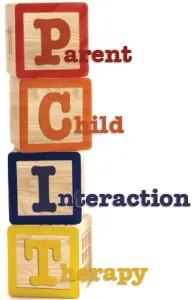What Is Parent-Child Interaction Therapy?
 Parent-Child Interaction Therapy (PCIT) is a specialized form of play therapy designed to help parents improve their relationship with their child and manage challenging behaviors effectively using a “bug-in-the-ear” device. It is designed for use with kids ages 2-7 year old.
Parent-Child Interaction Therapy (PCIT) is a specialized form of play therapy designed to help parents improve their relationship with their child and manage challenging behaviors effectively using a “bug-in-the-ear” device. It is designed for use with kids ages 2-7 year old.
Here’s how PCIT works and how it can benefit you and your child:
1. Focus on the Parent-Child Relationship:
PCIT places a strong emphasis on enhancing the bond between parents and their
children. The therapy is designed to strengthen your relationship with your child and improve communication.
2. Two Phases of PCIT: PCIT is unique because it actively involves parents in the therapeutic process. The therapy typically consists of two main treatment phases, with each phase lasting approximately 6-8 weeks:
● Child-Directed Interaction (CDI): In this phase, parents are taught specific play therapy skills. They interact with their child in a controlled play environment while wearing an earpiece through which a therapist provides real-time coaching. Parents learn to follow the child's lead, use praise and rewards to reinforce positive behaviors, and ignore or redirect negative behaviors. The focus is on enhancing the parent-child bond and improving the child's self-esteem and confidence. This phase is also beneficial for children to learn appropriate play skills and increase their vocabulary.
● Parent-Directed Interaction (PDI): In the PDI phase, parents learn effective discipline techniques. They are taught how to set clear expectations, provide consistent consequences for both positive and negative behaviors, and use time-out and other appropriate disciplinary strategies. The therapist continues to provide guidance and feedback, helping parents refine their discipline skills.
3. Key Techniques and Skills:
● Reflective Listening: You'll learn to listen and reflect your child's feelings, helping them feel understood and valued.
● Effective Discipline: You'll learn appropriate discipline techniques that don’t involve harsh punishments, helping your child understand boundaries and consequences.
● Therapist Support: PCIT is typically conducted with the guidance of a trained therapist who observes parent-child interactions, provides coaching and feedback, and helps parents develop their skills.
● Positive Reinforcement: PCIT emphasizes the use of positive reinforcement to encourage desirable behaviors in children. Parents are taught to praise and reward positive behaviors effectively.
● Consistency: One of the essential aspects of PCIT is consistency in parenting techniques. Parents learn to apply the skills consistently, which helps in reducing challenging behaviors over time.
● Emotional Regulation: PCIT helps children develop emotional regulation skills, teaching them appropriate ways to express and manage their emotions.
4. Benefits for Parents:
● Improved Parenting Skills: PCIT equips you with practical strategies to handle challenging situations and manage your child’s behavior.
● Increased Confidence: As you witness positive changes in your child’s behavior, your confidence as a parent will grow.
● Reduced Stress: Learning effective techniques reduces parental stress, making your parenting journey smoother.
5. Benefits for Children:
● Improved Behavior: PCIT helps your child learn appropriate behaviors and social skills, leading to better conduct at home and in social settings.
● Emotional Regulation: Your child learns to express emotions properly and develop better emotional regulation skills.
● Stronger Relationship: The therapy strengthens your bond with your child, creating a supportive and nurturing environment.
6. Long-Term Impact:
● PCIT’s positive effects are long-lasting. Children who receive PCIT often show sustained improvements in behavior, even after therapy concludes.
7. Your Active Participation is Key:
● Your active involvement and consistent use of PCIT techniques at home are crucial. The skills you learn in therapy sessions should be practiced regularly.
 While Parent-Child Interaction Therapy (PCIT) is a highly effective intervention for many families, there are certain situations where it might be contraindicated or require modifications. Contraindications are conditions or factors that make a particular treatment or intervention potentially harmful or ineffective for an individual. In the case of PCIT, contraindications or modifications might include:
While Parent-Child Interaction Therapy (PCIT) is a highly effective intervention for many families, there are certain situations where it might be contraindicated or require modifications. Contraindications are conditions or factors that make a particular treatment or intervention potentially harmful or ineffective for an individual. In the case of PCIT, contraindications or modifications might include:
1. Severe Mental Health Disorders: PCIT may not be suitable for families where the child or parent has severe mental health disorders that impair their ability to participate effectively in therapy. In such cases, individual therapy or specialized treatments may be more appropriate.
2. Child Abuse or Neglect: If there are ongoing issues of child abuse or neglect within the family, PCIT
might not be appropriate until these issues have been adequately addressed. Child protection and safety are paramount.
3. Parental Substance Abuse: Families where there is active substance abuse might find it challenging to engage effectively in PCIT. Addressing substance abuse issues is often a priority before engaging in family therapies.
4. Developmental Disabilities: PCIT may need to be modified for families where the child or parent has significant developmental disabilities. Specialized therapists experienced in working with individuals with developmental disabilities may be necessary.
5. Lack of Parental Engagement: PCIT requires active participation and consistent involvement from parents. If
parents are not willing or able to participate fully, the effectiveness of the therapy may be limited.
6. High Family Stressors: Families dealing with extreme stressors such as ongoing domestic violence, homelessness, or other significant life crises might find it difficult to engage effectively in PCIT until these stressors are alleviated or managed.
7. Child's Age: While PCIT is designed for children between the ages of 2 and 7, it might not be appropriate for all children within this age group. Therapists assess the child’s readiness and suitability for the intervention.
8. Cultural Considerations: Cultural factors and family dynamics vary widely. Therapists need to be sensitive to cultural differences and adapt the therapy to be culturally appropriate. It's important for families and therapists to have an open and honest discussion before starting PCIT to ensure that it is the right intervention for their specific situation. In some cases, other forms of therapy or support might be more suitable. Therapists trained in PCIT are skilled at evaluating whether the therapy is appropriate for a particular family and can make recommendations accordingly.
It's important for families and therapists to have an open and honest discussion before starting PCIT to ensure that it is the right intervention for their specific situation. In some cases, other forms of therapy or support might be more suitable. Therapists trained in PCIT are skilled at evaluating whether the therapy is appropriate for a particular family and can make recommendations accordingly.
Parent-Child Interaction Therapy At Milestones Counseling
 In summary, PCIT empowers you with the skills and confidence to manage your child’s behavior effectively while fostering a positive and loving parent-child relationship. By applying PCIT techniques, you can create a supportive environment where your child can thrive emotionally and behaviorally. Remember, your therapist will guide you through the process, offering support and encouragement every step of the way. It's important to note that PCIT should be conducted by trained and certified therapists. Parents actively participate in the therapy process and are crucial in implementing the
In summary, PCIT empowers you with the skills and confidence to manage your child’s behavior effectively while fostering a positive and loving parent-child relationship. By applying PCIT techniques, you can create a supportive environment where your child can thrive emotionally and behaviorally. Remember, your therapist will guide you through the process, offering support and encouragement every step of the way. It's important to note that PCIT should be conducted by trained and certified therapists. Parents actively participate in the therapy process and are crucial in implementing the
learned techniques at home for the therapy to be effective.
For more information about how we can help or to schedule a PCIT appointment, please use our contact form or call (443) 574–4295.
